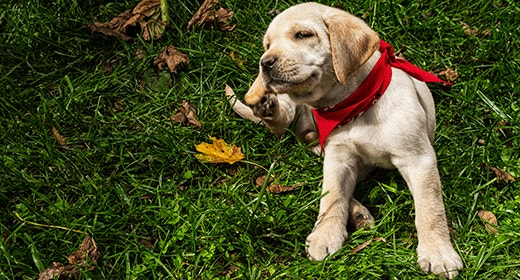

You do everything you can to keep your new puppy happy, and having fleas is definitely not a happy time. Keep these tips in mind to keep your puppy healthy, happy, and flea-free.
The common flea not only causes your dog discomfort, but it can also transmit disease, pass on tapeworms, and cause anemia, especially in vulnerable puppies and older dogs. Regularly inspect your dog for any signs of fleas. Intermittent scratching, biting, and gnawing, plus evidence of flea dirt between your dog's back legs or on top of his rump, are telltale signs of fleas. If your dog is constantly biting and gnawing himself or you can actually see fleas, you've got a full-blown infestation. To check out your dog for fleas, have him stand in a bathtub and vigorously rub your hands through his fur. If little dark dots fall on the tub floor, they're likely either fleas or flea 'dirt' (excrement). You'll know you've got fleas if the 'dirt' turns red when you add a drop of water.
These products work by preventing fleas from biting or reproducing. They are the flea control methods of choice, and when used faithfully as directed, help pet owners avoid many dog health issues associated with fleas.


Watch as Expert Dog Trainer Kathy Santo talks about all the research that goes into finding the perfect puppy. From breed and temperament to barking, you’ll learn all the details that are often overlooked by people when they’re shopping around for a new best friend.
Hi, I'm Kathy Santo with IAMS. Are you thinking of getting a dog? Bringing a new dog into your home is a big responsibility. You'll need to take the time to train and socialize your dog, as well as be prepared for the financial commitment that goes with pet ownership. Your dig will need food, supplies, veterinary care, and more. Remember, he'll depend on you for his health and well being. So be sure you're ready for a dog before you start the process. No surprise puppies. Make sure everyone in your household is on board with getting a puppy. Too often, puppies are given up if the family isn't ready for the commitment that puppies require. Once you've thought through the commitments and responsibilities associated with dog ownership, the next step is to figure out what type of dog is right for you and your family. Today we're going to discuss a variety of things you should think about before choosing your dog. What type of family do you have? Do you have kids or other pets? What size of dog works best for your family? Do you know how much cleaning and grooming time you can commit to? How much time do you have for training your new pup? What energy level is a good fit for your home? Is barking something to consider? What kind of temperament is right for your family? We all know how cute puppies and dogs are, and it can be hard to resist when you go to pick them out. Remember, they'll have an easier transition into your home if you think about the best type of dog for you. Consider the following aspects to help you choose the best dog for you and your family. Large dogs-- generally they aren't as suitable for apartment dwellers. They need a bit more space to move around, mostly for their long tails that need wagging space. They tend to be more expensive-- more dog food supplies and medical treatment. Small dogs-- they are more delicate and vulnerable. Being stepped on or mishandled can cause serious injury. Also, little dogs can be more sensitive to colder temperatures, so be ready to keep them warm. They're generally less expensive to maintain. How much cleaning up can you commit to? Long coated and double coated dogs shed, shed, and shed some more, leaving tufts of hair to float about the house and land everywhere. How much time are you willing to spend brushing or grooming? Make sure to consider the costs. A monthly grooming service can really add up over the years. If you lack time and patience to deal with a dog that's difficult to train, then an older dog from a rescue may fit your bill as well as a pup of a breed that is traditionally easier to train. Intelligence is not necessarily an indicator of train ability. Smart dogs often have their own agenda and require consistency on the part of their owners. Dogs with a willingness to work and a desire to please you often turn out to be the best companions. I recommend hiring a dog trainer to perform a few tests to help determine if the dog is a good fit for you. As a rule, terriers, hounds, and northern dogs are tough to train because of their intelligent and independent natures, while sporting and herding dogs are easier to train. The sharpest working obedience breeds are golden retrievers, Labrador retrievers, border collies, German shepherds, and Shetland sheepdogs, breeds that develop closely with humans. Some dogs enjoy lounging at your feet to sleep the day away, while others are very energetic and ready to run a marathon right alongside you. Cute as they are, basset hounds, dachshunds, and corgis are not jogging companions. And Airedales, German shepherds, and border collies are not typical couch potatoes. All dogs need some exercise to stay healthy. Most adult dogs will not exercise themselves, so time for walks and other activities is important. Some dogs bark a lot, and the amount can vary by breed. Terriers and scent hounds use their voices to broadcast their progress in chasing prey. Shelties and collies bark to tell the sheep to get back to the barn. Canaan dogs bark to alert their families of potential intruders. Many dogs will bark if they're bored, so owners should also be sure to assess their own time and ability for training, walking, and play times, and should properly confine the dog when they can't otherwise keep it from disturbing the neighbors. There are some special collars available to deter barking dogs, and training methods that can help in some cases. But if potential owners take the noise factor into consideration, problems are more likely to be minimized. Breed and temperament can be described, but there is room within that description for individuality. For example, akitas are declared to be tough, loyal, aloof, dominant, aggressive to other animals, and often challenging. However, many akitas are sweet and cuddly, loves small critters, will climb in laps if allowed, and are anything but aloof and dominant. Terriers are scrappy, yappy, tough, and independent. But Airedale terriers bond very closely to their humans, and are somewhat protective. Hounds follow their eyes or noses, and are often oblivious to human presence. Dachshunds bond closely with their families, and greyhounds and whippets are sweet, gentle pets. Because temperament isn't always easy to judge when meeting a new dog, I strongly recommend hiring or asking a professional dog trainer to come with you to evaluate temperament. They'll be able to assess the dog's personality, compare it with your wish list, and determine what dog is the best fit for you. If you can arrange this, ask the people who've interacted with the dog the most about his temperament. Once you've thought about the commitments and have a good idea of what type of dog is the best fit for your family's lifestyle, check out your local animal shelter or animal rescue to see if a new addition is waiting there for you. I'm Kathy Santo with IAMS, and I hope you found this helpful as you welcome your new addition into your family.